By Annabelle Lee
COVID-19 | Some Covid-19 patients in the Klang Valley have experienced a less than smooth recovery, facing setbacks in being transported to quarantine facilities and enduring poor conditions there.
Interviews with Covid-19 patients suggest that the Health Ministry’s pandemic response is also being hampered by serious contact tracing delays.
This comes as active cases in Kuala Lumpur and Selangor swell to more than 13,000.
Six patients Malaysiakini spoke to said they waited at home for several days after testing positive before being transferred to a healthcare facility.
They were all admitted in December – some did not receive any contact tracing calls and took it upon themselves to carry out the process. Others received the call only after they had been discharged.
Meanwhile, those warded at the Health Ministry Training Institute (ILKKM) in Sungai Buloh noted the questionable conditions there.
Patients said they spent hundreds of ringgit on meal deliveries following food safety concerns at the quarantine and low-risk treatment centre.
The Health Ministry had yet to respond to these claims at publication time.
Doing own contact tracing
Lia (pseudonym), a 25-year-old Covid-19 patient, was discharged on Dec 29.
As of Jan 1, she said no one from her local district health office had contacted her about contact tracing. She tested positive on Dec 20.
The musician shared with Malaysiakini how she performed her own contact tracing by informing those she had met two weeks prior to her testing positive about her infection.
Of all her close contacts who got tested after she advised them to, one person was found positive.
“It’s very worrying because this is how you curb the virus, by doing contact tracing and making sure everyone gets tested and isolates (themselves),” Lia said.
Izzah Batrisyia was surprised when she received a contact tracing call on Dec 29 – 10 days after she tested positive and after she had been discharged.
She was even more surprised when the health inspector appeared to be in the dark about her infection, informing her instead that she was a close contact of someone else.
The 22-year-old fitness centre employee shuddered to think about the data backlog faced by the ministry.
“Contact tracing should have been the first thing, the first call I got when I tested positive… but I only got my call 10 days after and when that happened, they didn’t even know I was Covid-19 positive,” she said.
Close contacts are defined as someone who has been exposed to a Covid-19 patient for 15 minutes or more, had less than one metre of distance between them, had physical contact with them and was not wearing a face mask.
Covid-19 and diarrhoea
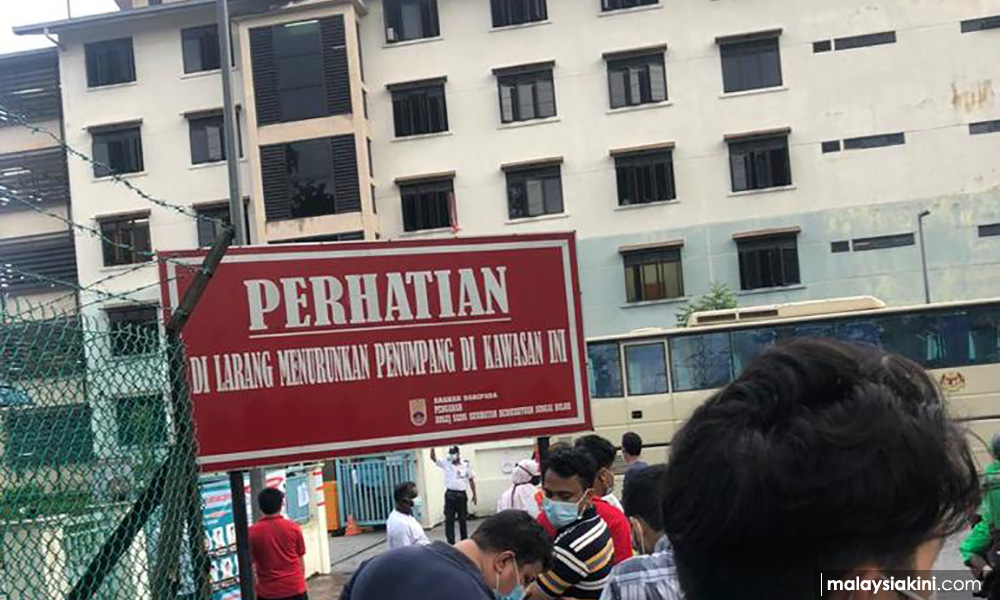
Both Lia and Izzah were warded at ILKKM, a training college that was converted last October into a centre for asymptomatic Covid-19 patients or those with mild symptoms.
Located next to Sungai Buloh Hospital, hostel blocks on the premises are being used as male and female wards. As of Dec 28, 2020, 71 percent (1,918) of the 2,700 beds at ILKKM were occupied.
Patients are served four meals a day but are also allowed to accept food deliveries. However, deliveries can only be made between 10am and 12 noon or 5pm to 7pm at the entrance, subject to several rules.
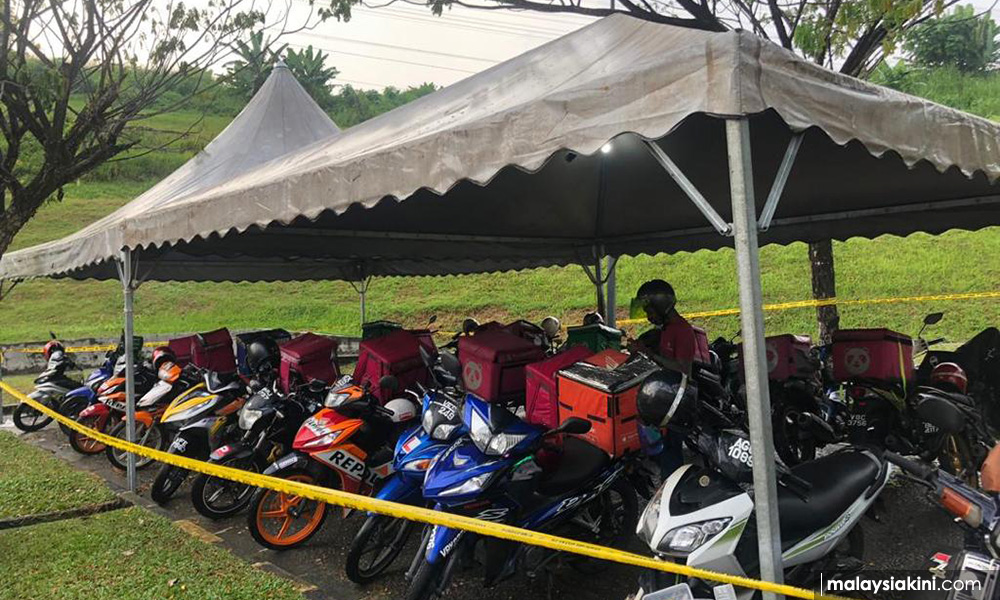
Food delivery bikes outside ILKKM.
Lia began ordering in her lunch and dinner after other patients said that the food provided was basi (spoiled) and had resulted in upset stomachs for some.
She said she had lost her sense of smell and taste after contracting Covid-19 and thus relied on other patients to determine if the food provided was safe for consumption.
Lia estimated she spent more than RM200 on food deliveries during her six days at the centre.
Similarly, 36-year-old Marliana Umar said she spent about RM800 on food deliveries for her, her relative and several other patients during the eight days she was at ILKKM.
She told Malaysiakini that she decided to purchase all her meals despite the high cost after experiencing diarrhoea on her first day there.
“Many others also got diarrhoea,” she claimed.
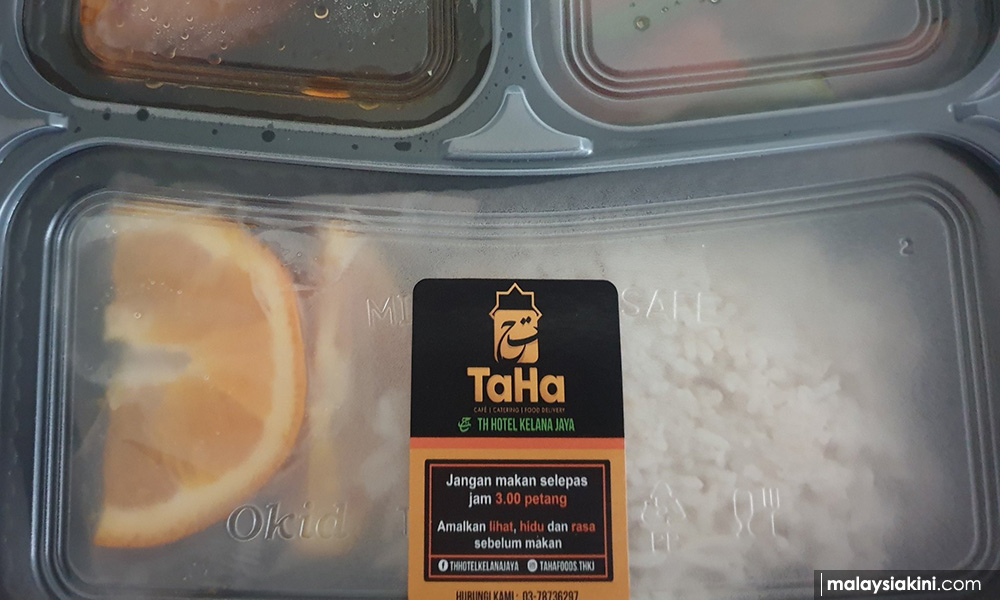
A meal pack provided at ILKKM.
ILKKM patients told Malaysiakini that the meals were supplied by Tabung Haji Hotel Kelana Jaya.
They also shared how the high volume of food orders caused long queues outside ILKKM every day.
Some ended up missing out on meals because their food could not be dropped off in time before the delivery window closed.
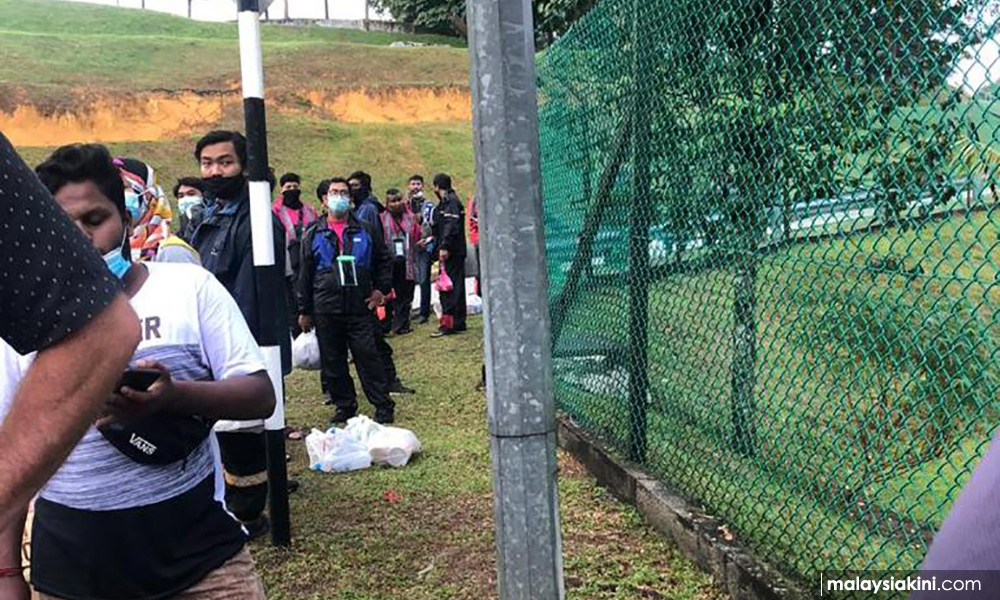
Some family members of ILKKM patients have since taken to social media to raise concern over the issue, even organising donation drives to have dry food delivered to the centre.
Unlike the rest, Nur Shahira Sofea Abdul Rahim could not rely on food deliveries due to the prohibitive cost.
The 24-year-old lost her sense of taste and smell due to the virus and only found out that the food had gone bad from a fellow patient. When she started experiencing diarrhoea, she decided to stick to dry food but also continued to consume the meals provided.
“I can’t afford to buy food all the time. The delivery charges are high and it is very troublesome to wait for the food.
“If I could not bear to eat the food provided, I would eat the instant noodles and biscuits that I brought,” said Shahira, who works at a hotel in Kuala Lumpur.
Limited help, supplies
Aside from concerns over food safety, ILKKM patients also said that the bathrooms were poorly sanitised.
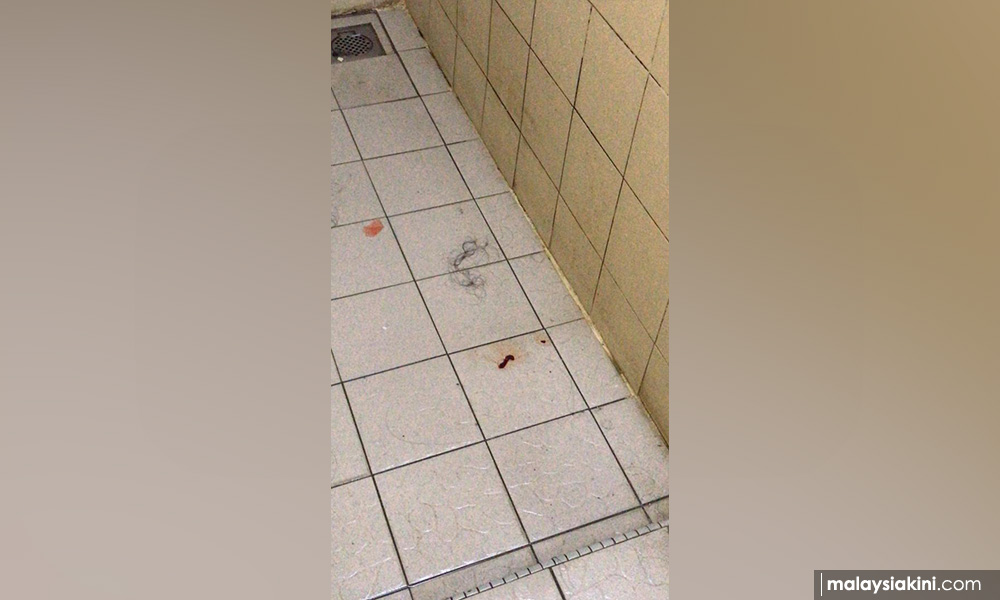
An ILKKM shower room with what appears to be a bloodstain on the floor.
Lia shared how she discovered what appeared to be bloodstains on the shower room floor. Several others noted that the toilets in one of the women’s blocks were often blocked and wet.
Another common remark was the shortcomings in terms of patient care and supplies.
According to Izzah, ILKKM staff offered little help when her younger sister – who was in the same ward as her – experienced shortness of breath, a Covid-19 symptom.
In Syahirah Adnan’s case, she was enraged after staff failed to help her 60-year-old mother when the latter suffered an asthma attack whilst warded at the centre.
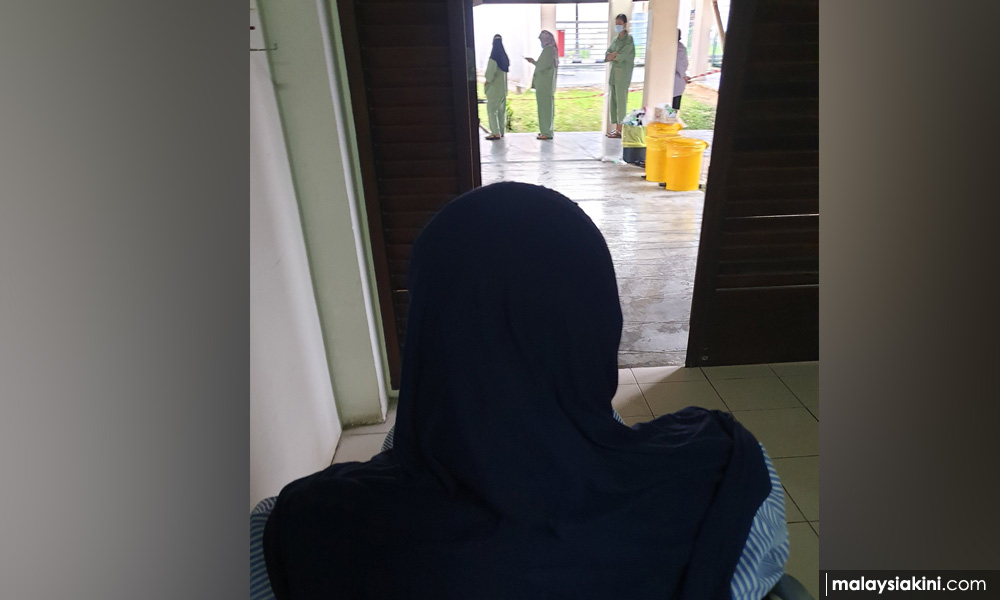
The 34-year-old said they had to wait several hours for an ambulance to take her mother next door to Sungai Buloh Hospital.
As there were many patients – almost 300 in a block – but few staff members, Syahirah shared that they had to personally ask for assistance.
Since there were no elevators, she said she had to carry her elderly mother on her back from their level two ward down a flight of stairs to the ground floor to seek medical attention.
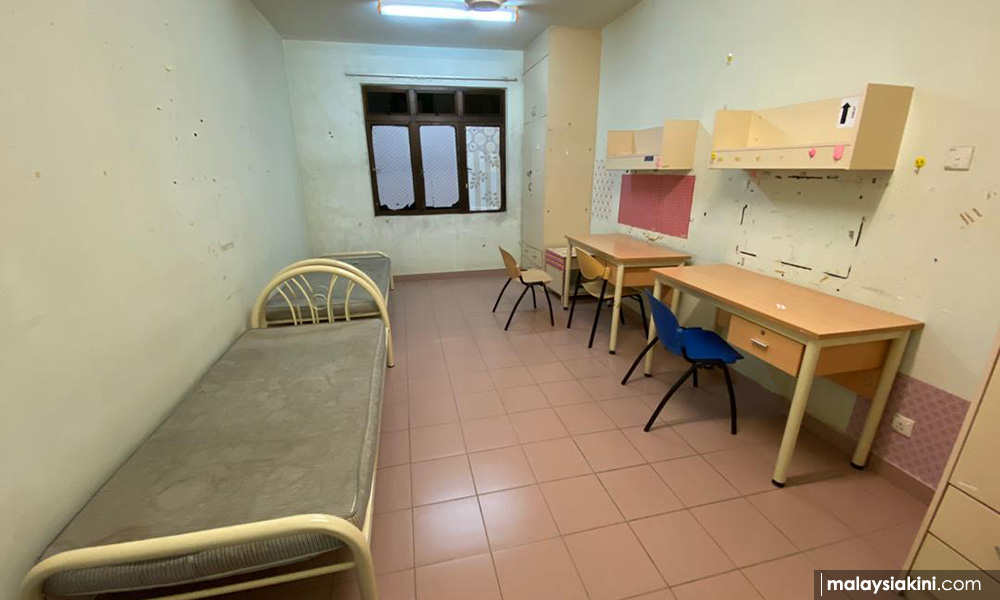
Meanwhile, both Lia and Marliana along with 23-year-old Covid-19 patient Wan Arif Iskandar Adnan said the centre had run out of either blankets, bedsheets, pillows or scrubs when they arrived at ILKKM.
They had to wait several days before receiving the supplies.
Lia further noted a shortage of disposable surgical face masks at the centre despite a requirement for patients and staff to wear one at all times.
Moving while in quarantine
For Syahirah, the past week has been an ordeal for not just her and her mother but for their entire family as well. Eight from her household tested positive for Covid-19 on Christmas day.
She and her mother have thus far been warded in four different facilities – mostly at their request to accommodate her mother’s health conditions.
Her brother and young niece, meanwhile, have been moved thrice at the ministry’s orders. Another one of her brothers was transferred by the ministry to a different centre mid-way through his quarantine period.
Syahirah questioned the rationale behind the moves, saying the exercise was especially tiring for patients taking care of infected children and elderly folk.
Ferrying Covid-19 patients to different localities also appeared contrary to the need to quarantine them.
“My brother was actually moved three times in 24 hours… it was really hard for him because he had to carry all the luggage.
“For my mom, I had to carry all her belongings and piggy-back her.
“Nobody was there to help us as we are Covid-19 patients, I understand this,” she said.
Health director-general Dr Noor Hisham Abdullah previously refuted claims that the Klang Valley healthcare system was overwhelmed or faced bed shortages.
However, beds are filling up fast at quarantine and low-risk treatment centres such as ILKKM and the National Leprosy Centre (PKKN) as well as at Sungai Buloh Hospital – which only admits Covid-19 cases.
More beds have been added to the quarantine and low-risk treatment centre at the Malaysian Agro Exposition Park Serdang (Maeps) in preparation for the growing number of infections.
Now with 6,132 beds, the ministry plans to raise the number at Maeps to 10,000.
